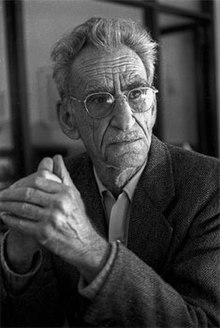George Oppen
| George Oppen | |
|---|---|

December 1980 Berkeley, CA (Photo by Richard Friedman)
|
|
| Born |
April 24, 1908 New Rochelle, New York, U.S. |
| Died | July 7, 1984 (aged 76) California, U.S. |
| Occupation | Poet |
George Oppen (April 24, 1908 – July 7, 1984) was an American poet, best known as one of the members of the Objectivist group of poets. He abandoned poetry in the 1930s for political activism and later moved to Mexico to avoid the attentions of the House Un-American Activities Committee. He returned to poetry — and to the United States — in 1958, and received the Pulitzer Prize in 1969.
Oppen was born in New Rochelle, New York into a Jewish family. His father, a successful diamond merchant, was George August Oppenheimer (b. Apr. 13, 1881), his mother Elsie Rothfeld. His father changed the family name to Oppen in 1927. Oppen's childhood was one of considerable affluence; the family was well-tended to by servants and maids and Oppen enjoyed all the benefits of a wealthy upbringing: horse riding, expensive automobiles, frequent trips to Europe. But his mother committed suicide when he was four, his father remarried three years later and the boy and his stepmother, Seville Shainwald, apparently could not get along. Oppen developed a skill for sailing at a young age and the seascapes around his childhood home left a mark on his later poetry. He was taught carpentry by the family butler; Oppen, as an adult, found work as a carpenter and cabinetmaker.
In 1917, the family moved to San Francisco where Oppen attended Warren Military Academy. It is speculated that during this time Oppen's early traumas led to fighting and drinking, so that, while reaching maturity, Oppen was also experiencing a personal crisis. By 1925, this period of personal and psychic transition culminated in a serious car wreck in which George was driver and a young passenger was killed. Ultimately, Oppen was expelled from high school just before he graduated. After this period, he traveled to England and Scotland by himself, visiting his stepmother's relative, and attending lectures by C.A. Mace, professor in philosophy at St. Andrews.
In 1926, Oppen started attending Oregon State Agricultural College (what is now Oregon State University). Here he met Mary Colby, a fiercely independent young woman from Grants Pass, Oregon. On their first date, the couple stayed out all night with the result that she was expelled and he suspended. They left Oregon, married, and started hitch-hiking across the country working at odd jobs along the way. Mary documents these events in her memoir, Meaning A Life: An Autobiography (1978).
...
Wikipedia
